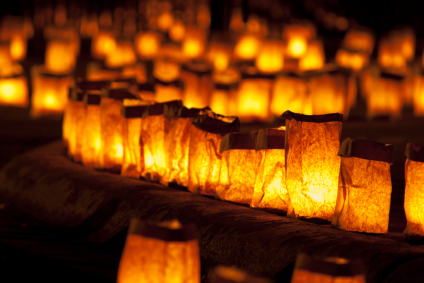A candle in sand in a paper bag
Archbishop Elias Chacour of the Melkite Catholic Church in the Holy Land began his ministry in a small Galilean Arab village called Ibillin. There he built a series of schools, beginning with an elementary school and now going all the way to a college. He's committed his schools to the challenging balance between the pursuit of justice for the poor and politically oppressed and lasting reconciliation between enemies. He believes one is not possible without the other, and he believes that's true in all cases and in every land.
 In the summer of 1982 I had a chance to throw some dirt around the shell of the then only anticipated Mar Elias High School in that little village—pretending to help, but mostly taking it all in and asking questions. In the evening, the small group I was with had the chance to sit on the roof of the then village priest's residence. We sat with him, on a dark but special night. It was the feast of his namesake, the prophet Elijah. It was also the middle of Israel's invasion of Lebanon. Our conversation was punctuated by the sound of warplanes overhead, on their way north. It was a chilling sound, and led our host to a genuine despair. What good were his efforts? What value was the work? What hope was there for these peoples he tried to serve?
In the summer of 1982 I had a chance to throw some dirt around the shell of the then only anticipated Mar Elias High School in that little village—pretending to help, but mostly taking it all in and asking questions. In the evening, the small group I was with had the chance to sit on the roof of the then village priest's residence. We sat with him, on a dark but special night. It was the feast of his namesake, the prophet Elijah. It was also the middle of Israel's invasion of Lebanon. Our conversation was punctuated by the sound of warplanes overhead, on their way north. It was a chilling sound, and led our host to a genuine despair. What good were his efforts? What value was the work? What hope was there for these peoples he tried to serve?
During our discussion, one of the nuns came running up the stairs as if there was a great emergency. She called to the priest and motioned him to the edge of the roof. We joined him. There, over the valley between the residence and the shell of a school, we could see where the children who dreamed of that school for their future had put luminaria (those candles in sand in paper bags) in each of the rooms on each of the floors. There was also a row on the ground in front—all in perfect view of their spiritual father's (their "Abuna's") residence on this feast day for his patron saint. It was a surprise.
"Perhaps there is hope," he said through tears. "We must continue building for peace."
Fourteen years later, in 2006, now an Archbishop, Elias wrote the same thought in a pastoral letter to his supporters around the world. He used more metaphor and waxed theological, but the message was the same. It seemed to resonate in the world we still live in. He wrote this:
No matter what, or rather because of what surrounds us, we do believe that the whispers of the Crucified One are stronger than the bombs of the war lords.
They cannot be left alone to make history. God is also at work to form history.
While violence and explosions destroy, humility and love make roots deep in the hearts of men and women of good will.[i]
I write while the bombs at the Boston Marathon are still echoing. I write while some are still unpacking a story of chemical weapons used in Syria. I write when peace is still elusive between Palestinians and Israel, and suffering continues. I write in a still hostile and troubled world, with violence in homes as well as in streets.
I also write with the word from the nun beckoning us to the edge of the roof still echoing too. I write in a world of beauty, love, and spiritual discipline—where peace is still made and the whispers of the Crucified One still vibrate our certainties and beg our attention. A candle in sand in a paper bag shining a light that no darkness can put out.
[i] Annual letter [2006], Office of His Excellency Archbishop Chacour and the Mar Elias Educational Institutions, PO Box 102, Ibillin 30012, Galilee, Israel
